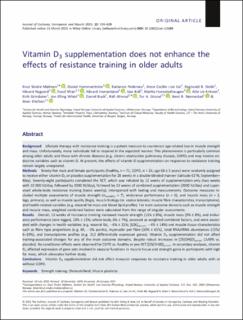| dc.description.abstract | Background: Lifestyle therapy with resistance training is a potent measure to counteract age-related loss in muscle strength and mass. Unfortunately, many individuals fail to respond in the expected manner. This phenomenon is particularly common among older adults and those with chronic diseases (e.g. chronic obstructive pulmonary disease, COPD) and may involve endocrine variables such as vitamin D. At present, the effects of vitamin D supplementation on responses to resistance training remain largely unexplored. Methods: Ninety-five male and female participants (healthy, n = 71; COPD, n = 24; age 68 ± 5 years) were randomly assigned to receive either vitamin D3 or placebo supplementation for 28 weeks in a double-blinded manner (latitude 61°N, September-May). Seventy-eight participants completed the RCT, which was initiated by 12 weeks of supplementation-only (two weeks with 10 000 IU/day, followed by 2000 IU/day), followed by 13 weeks of combined supplementation (2000 IU/day) and supervised whole-body resistance training (twice weekly), interspersed with testing and measurements. Outcome measures included multiple assessments of muscle strength (nvariables = 7), endurance performance (n = 6), and muscle mass (n = 3, legs, primary), as well as muscle quality (legs), muscle biology (m. vastus lateralis; muscle fibre characteristics, transcriptome), and health-related variables (e.g. visceral fat mass and blood lipid profile). For main outcome domains such as muscle strength and muscle mass, weighted combined factors were calculated from the range of singular assessments. Results: Overall, 13 weeks of resistance training increased muscle strength (13% ± 8%), muscle mass (9% ± 8%), and endurance performance (one-legged, 23% ± 15%; whole-body, 8% ± 7%), assessed as weighted combined factors, and were associated with changes in health variables (e.g. visceral fat, -6% ± 21%; [LDL]serum , -4% ± 14%) and muscle tissue characteristics such as fibre type proportions (e.g. IIX, -3% points), myonuclei per fibre (30% ± 65%), total RNA/rRNA abundances (15%/6-19%), and transcriptome profiles (e.g. 312 differentially expressed genes). Vitamin D3 supplementation did not affect training-associated changes for any of the main outcome domains, despite robust increases in [25(OH)D]serum (∆49% vs. placebo). No conditional effects were observed for COPD vs. healthy or pre-RCT [25(OH)D]serum . In secondary analyses, vitamin D3 affected expression of gene sets involved in vascular functions in muscle tissue and strength gains in participants with high fat mass, which advocates further study. Conclusions: Vitamin D3 supplementation did not affect muscular responses to resistance training in older adults with or without COPD. Keywords: Cholecalciferol; Muscle plasticity; Strength training. © 2021 The Authors. Journal of Cachexia, Sarcopenia and Muscle published by John Wiley & Sons Ltd on behalf of Society on Sarcopenia, Cachexia and Wasting Disorders. | en_US |

